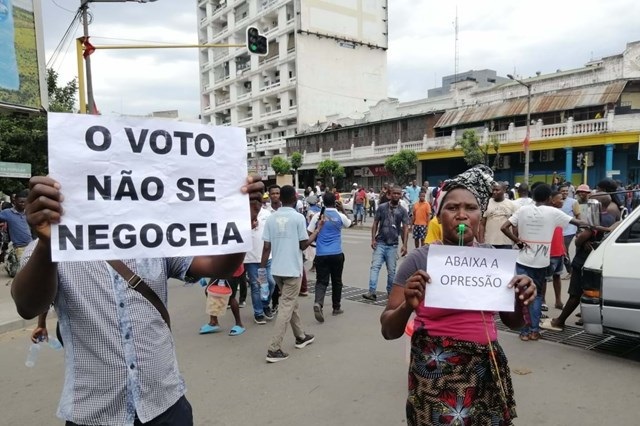Mozambique: At least seven killed by insurgent attacks in Cabo Delgado
Mozambique: Selling whistles a roaring trade at protests

FILE - For illustration purposes only. [File photo: Lusa]
Oldemiro arrived early in the centre of Maputo on Friday to try to profit from a trendy business among informal workers: selling whistles, the instrument most heard on the streets since the start of the demonstrations against the election results in Mozambique.
“The whistle is what’s in fashion. Everywhere you go, you have to have a whistle. It’s our new business (…) It’s a way for me to get a bit of bread,” Oldemiro Vasco, 26, told Lusa moments after selling another whistle amidst the hustle and bustle of one of the main markets in the Chamanculo neighbourhood on the outskirts of Maputo.
For most local traders, it’s an atypical day, with restrictions on vehicle circulation as a result of yet another stage in the demonstrations called by Venâncio Mondlane, the presidential candidate contesting the election results of 9 October.
As in the previous two days, between 08:00 and 16:00, dozens of young people are on the streets, blocking the circulation of vehicles in various stretches with barricades, demanding that the “electoral truth” be restored, holding placards in support of Mondlane, to the sound of whistles and `vuvuzelas’.
Oldemiro, who has been selling beauty products on the streets and avenues of the Mozambican capital for five years, saw the demonstrations as an opportunity. Now, whenever Mondlane calls for a demonstration on his popular Facebook page, he takes to the streets to “profit” in the midst of the “confusion”.
“It’s 10 meticais (€0.14), which colour do you prefer?”, Oldemiro asks a man passing by the main entrance to the market, who immediately replies with a slight smile on his face: “yellow, of course”, alluding to the colours of the party that supports Mondlane, Podemos.
On “normal days of demonstrations” against the election results, Oldemiro sells 48 whistles, especially on Avenida Eduardo Mondlane and Avenida 24 de Julho, the epicentres of demonstrations that sometimes end in skirmishes between police and protesters.
“I have to watch out for confusion. When the gas starts and I run out,” he said.
At the informal vendors’ stalls on 24 de Julho, both women and men, the whistle is an almost obligatory instrument, an “important element” in the soundtrack that has echoed along the road in recent days from 8 a.m., the time the blockades began.
Júlia Geraldo, for example, sells mangoes and bananas with her whistle hanging around her neck on 24 de Julho and, whenever possible, blows it as a way of “fighting”.
“I’m fighting for my homeland and, at the same time, for my children’s lives (…). I can’t stay at home. This is my bread. The protesters are there and not hurting anyone,” the 25-year-old explained to Lusa.
Not far from Júlia Geraldo’s stall, 45-year-old Zito Marcial has his whistle in his hand. While selling shoes, he says he’s in solidarity with those on the streets calling for the restoration of the “electoral truth”.
“They have their right because they are demanding electoral truth. Someone is trying to usurp another’s power and this is not the time for that,” concluded Zito Marcial.
The wave of demonstrations in Mozambique, with around 70 deaths and more than 200 gunshot wounds in a month as a result of clashes with the police, has been called by Venâncio Mondlane, who is contesting the victory of Daniel Chapo in the presidential elections, with 70.67% of the votes, and, in the legislative elections, of Frelimo, which strengthened its absolute majority, according to the results announced by the National Electoral Commission (CNE).
In this phase, which began on Wednesday, at least eight people died, and another 20 were injured as a result of gunfire in Mozambique, said on Saturday (November 30) the Mozambican non-governmental organisation (NGO) Plataforma Eleitoral Decide.
Data from the November 27-29 protests #MozambiqueElections#MozambiqueProtests pic.twitter.com/RNqNFWN1PL
— Plataforma_decide (@PDecide23) November 30, 2024
On Tuesday, presidential candidate Venâncio Mondlane called on the Mozambican population to leave their cars in the streets from 8am for three days, starting on Wednesday, with election protest posters until they return from work.












Leave a Reply
Be the First to Comment!
You must be logged in to post a comment.
You must be logged in to post a comment.